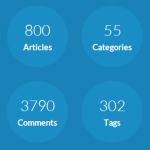One of my favorite ways of procrastinating is creating irrelevant things that look nice. Just…
Social Media, and Social Me
Some of you may have noticed that, among bloggers, articles about social media are all the rage these days. Every day I'm reading (well OK, scanning) more than 100 software development and project management blogs, and many of them regularly have something to say about Twitter, Facebook, or any of the other social networks out there.
Some examples from the last couple of days: Why Bother Looking at Social Media for Use in Projects (Bas de Baar), What the F**k is Social Media? (Chris Spagnuolo), An Aspirational Twitter (Michael Lopp), and The Difference Between Twitter and Facebook (Dare Obasajo). And let's not forget the great StackOverflow and (new) ServerFault web sites, which are nothing less than complete social networks on their own.
This is all making me feel outdated. I haven't been writing much about social media and social networks. And I'm often not up-to-date about the latest trends either. (It took me weeks to come across the Susan Boyle video.) But I am interested in the phenomenon, as every complex system that consists of people is a social network. Software projects too.
Some people say that software developers aren't very social. They say that of me as well. And they're right. But only in a traditional old-fashioned sense. Those people don't realize that, through participation in MUDs, bulletin boards, Usenet, and open source projects, software developers were among the first people in the world to build on-line social networks. And they did so at least more than a decade before the term "social media" was coined and the rest of the world joined in. I was already making on-line friends across the world in 1993 as a software engineering student, from the university's computer rooms, while the "more social" students were drinking themselves to oblivion at the student's societies. It was just a matter of priorities.
And now Oprah and the non-geek part of the world have caught up. Many new networks have joined the social network ecosystem, and tools like Twitter, Yammer, and Ning are changing the way software developers communicate and build their products. And the pressure to distribute the production of software across the world only adds to the need to understand how social networks operate, and how we can properly use them.
So yes, it's good to know more about social networks. They are not simply time wasters. And I intend to read more about them. But should I also write more about social networks? Should I join the crowd of "social media experts" with my own blog?
Yes, and no. I do intend to write a bit more about social media, how they impact software development, and how you can make use of social networks for your projects. But I will try to do so from my usual complexity point of view. Meaning: I'm most interested in the network part, and not so much in specific media or tools.
And I'm not going to write about Susan Boyle.
(pictures by Intersection Consulting and andrewcherwenka)
 Twitter –
Twitter –  Subscribe –
Subscribe –  Newsletter –
Newsletter –  Bookmarks
Bookmarks
Latest, greatest and favoritest posts:
Don't Waste Your Time with Twitter
Communication = Information * Relationships
How Smart Managers Think




